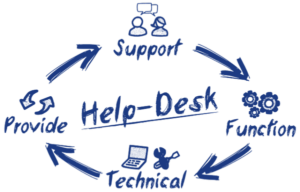Introduction
Due to the ever-growing threat of cybercrime we have compiled 6 IRS enforced security steps for accountants. When you work with a small-time IT person, it’s as if you’re only taking the standard deduction. Yes, that’s better than nothing, and for a lot of non-business owners, it’s adequate. But the level of attention that a team of professionals such as Rush Tech Support can provide a business is like meticulously itemizing your deductions. These days there are far too many risk factors simply allocating the bare minimum to your cybersecurity plan.
Here are six safety measures which can ensure your client information is as protected as it can be:
1. Install Antivirus Software
It is important to have a well-established and up to date, antivirus scanning the computer locally for viruses and malware. Most malware is downloaded without the user’s knowledge. Malware to get onto the system in a wide range of ways and equally broad spectrum scanning tools is required.
It is crucial that this antivirus is updated regularly to ensure that capable to scan for the latest threats as they become known. It is equally pivotal for these scans to run regularly. To ensure that both these tasks are done consistently, an antivirus which is managed by RMM software is the best choice. In our previous article, we highlighted some of the many benefits of RMM software and it is one of the ideal security steps for accountants. Regular maintenance scans, patch management, monitoring hardware health, and automatic malware scans just to name a few of the helpful features.
2. Have a Firewall
A firewall’s job is to stop threats from entering the network before they are able to infect an individual computer. Having solid antivirus on each computer is important but like drawing a gun on a burglar in your house. Sure, you stopped them before they did too much damage but they were inside. Having a firewall would be like the police arresting those same burglars as soon as they turn down your street.
Maintaining a good firewall will make sure that threats never even get close enough cause any damage. A hardware firewall’s job is to protect you from the outside internet by helping filter that traffic through the rules and policies of the device. An internal network computer is protected by a software firewall if one of them happens to get infected. Firewalls are security steps for accountants they should never skip.
3. Use Two-Factor Authentication When Possible
Having a strong password is important but many websites and software allow to 2-Step Authentication. This process entails an app like Google Authenticator, installed on a trusted device, that must also provide a code alongside having the correct password to sign in. 2FA requires the hacker to be in two places at once, and therefore, almost entirely eliminates the ability to hack your profiles or get into your customer’s data. Pairing 2FA with a strong password is the ultimate way to keep hackers out.
- What exactly is a strong password?
- Minimum of 8 Characters
- A combination of letters, numbers, and symbols.
- Avoids personal information like names or dates.
- Not a reused password from another sign-in.
4. Have Backup Software or Services.
Your client information is valuable. Valuable not only to those who would like to commit identity fraud but also to you invested a lot of time to prepare their tax information accurately. If disaster strikes and their files are lost, your irreplaceable time is also lost. Sometimes that information can be gathered again, calculated for a second time, but your time back can never be recovered. Time is money, having a redundant backup service could translate into huge savings when facing hardware failure strikes.
5. Use Hard Drive Encryption.
Using hard drive encryption is one of the most important security steps for accountants. Encryption works by running a file’s data through an algorithm that scrambles that information and makes it unreadable. However when the correct keycode is provided this information can be put back together into the original, easily readable file. One of the most common types of encryption is 256-bit encryption which means that the keycode is comprised of 256 individual bytes of information.
Windows users have the built-in Windows application Bitlocker available to ensure that the drives are properly encrypted. For Mac users, Mac FileVault is a great option also.
It is also important to not attach any USB drives with a client’s personal information to a possibly insecure computer. Doing so can open your client up to a host of issues the computer is already exploited by a hacker.
6. Have a Virtual Private Network.
In our previous article, we discussed why you needed a VPN in 2020. This is even more important for businesses. A VPN filters your internet traffic by encrypting the information and bouncing it to another server. This takes a lot of the possible risks out of using the open internet. Similar to how a hardware firewall protects you from the outside internet VPNs can be the software middleman between you and the open internet.
When running a VPN in conjunction with antivirus and a well-configured firewall a potential hacker would have to jump through too many hoops to even start breaking in. They rather just move on to a less secure target then slam their head against Fort Knox for a few weeks. Rest assured there are plenty of fish in that digital sea less savvy than you. That’s why this is a security step for accountants you can’t afford to skip.
For more details of exactly what the IRS specified refer to IRS Publication 4557, titled Safeguarding Taxpayer Data – A Guide For Your Business.
Also, the IRS prepared a video on The Taxes-Security-Together Checklist.
Conclusion:
Regardless of the size of your company, if you’re beholden to the IRS to do business, you have to play by their rules. IRS is the reason why Al Capone was behind bars. Don’t let simple mistakes lead to a breach in your client information which could cost you your livelihood. If navigating the complicated seas of cybersecurity seems daunting, it doesn’t have to be. Call Rush Tech Support at 844-880-7874 to schedule your security evaluation and we can ensure everything is up to code.




